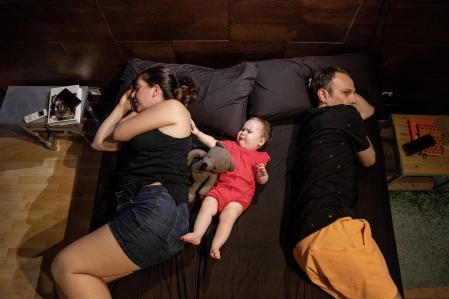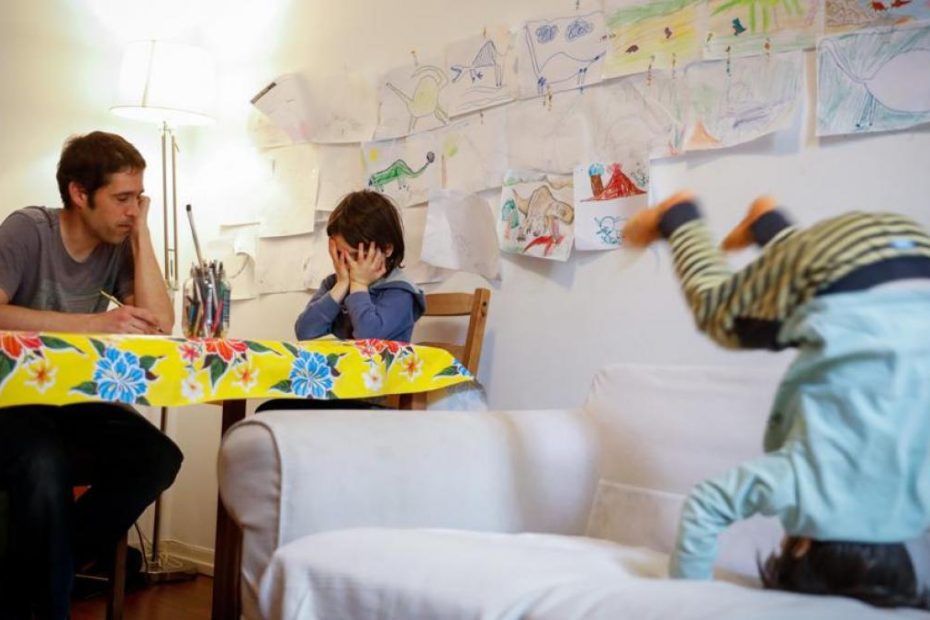


“Fathers and mothers under pressure.” This is the resounding title of the report (Advisory, in English), published by the United States Public Health Service, which warns about the increase in stress among fathers, mothers and caregivers during parenting. It is signed by Dr. Vivek H. Murthy, who holds the position of Director General of Public Health of the United States. This senior official is also known as “the nation’s doctor”: the person who provides Americans with the best scientific information in order to improve their health. The warnings that this organization publishes are reserved for significant events: “Circumstances that require the immediate knowledge and response of the nation.” In 1964, for example, the then Director General of Health warned of the health dangers of tobacco.
This latest report, published at the end of August, has received extensive media attention. In part, because it touches on a universal topic: parenting. And what he says invites reflection, since the US government warns that parental stress has become a public health problem. The report, supported by more than 150 studies, defines stress as “a state of worry or mental tension caused by a difficult situation,” and provides revealing data. In the last decade—and consistently—fathers and mothers have reported higher levels of stress compared to other adults. A discomfort that affects their daily lives: 41% say that “practically every day” they are so overwhelmed that they cannot function, while 48% define their stress as “overwhelming.” These figures are reduced by almost half in adults without children.
Parental Anxiety
48% suffer from “overwhelming” stress; 41% cannot function because of their overwhelm
It has always been said that having children is one of the best things that can happen to us. That something supposedly so beautiful is a source of discomfort causes mixed feelings. “In my conversations with parents and caregivers across the country, I have found that feelings of guilt and shame are pervasive,” Dr. Murthy writes in the introduction to the report. A doctor and vice admiral, educated at Harvard and Yale, the main spokesperson on public health issues in the United States has two children, so he sympathizes with those millions of parents who may feel overwhelmed by parenting. In fact, he also assures that, although he feels fortunate for the privilege of taking care of his two children: “I constantly wonder if I am doing it right.”
In this adverb, “constantly,” would be one of the keys to this current parental stress. A malaise that, as the report points out, directly affects children and has repercussions on the entire society: it affects the increase in spending on public health and has a negative impact on productivity. It is estimated that in the country there are 63 million families with children under the age of 18 in charge. For this reason, the report speaks of an issue of “national interest”, against which urgent measures must be taken.
What is happening in parenting that even a person as prepared as Murthy wonders, “constantly,” if he is doing it right? What are the factors that cause stress to invade us? The reasons are, according to the report, varied. Some, as classic as lack of sleep or adjusting to the role of parent when a baby is born. Without forgetting the helplessness in the face of tantrums and disruptive behaviors of children in adolescence.
The case of the United States
The six key causes of discomfort

The lack of time and rest for parents is one of the factors highlighted in the report
The report, however, specifies six key causes of unrest. Some are new; others, typical of our times. This is the case of the first, economic precariousness, a huge obstacle to a happy upbringing. The lack of means to cover the needs of children is a trigger for all kinds of anguish. Although they say that “the rich also cry”, it is much more difficult to raise children with few means.
The second stressor detailed in the report is concerns about the health of children. In this section, there is something new: in the 21st century—with vaccines and antibiotics available to almost everyone—the main fears focus on the mental health of minors. Three out of four American parents are worried about their child suffering from anxiety or depression.
In a country where there are school shootings, security is another major stressor (74% of American parents suffer from it). There, the Spanish parents would be, fortunately, far away. Lack of time (the feeling of “not arriving”) is another factor highlighted in the report that sounds familiar. Another variable is “the feeling of loneliness and social isolation,” which 65% of fathers and mothers claim to suffer. This figure rises to 77% when it comes to single-parent families.
Of course, technologies are a new factor that generates a lot of unease. Children’s online lives overwhelm families. A large majority of parents of adolescents say they feel “extremely concerned” that their children’s use of social networks: “Leads to problems such as anxiety and depression, low self-esteem, bullying, pressure to act in a certain way or exposure to content explicit.”
The sixth stress factor cited in the study is social expectations regarding parenting. That is to say: the cultural pressure to be perfect parents and have perfect children. In this factor – which occurs more in middle and upper class families – the online world also has a lot of weight. This is what Dr. Murthy says. The head of Public Health in the United States warns about “unrealistic expectations” about parenting, “generated in an increasingly intense culture of comparison, often propagated by influencers and online trends.” Chasing these excessive expectations, he writes, “has left many families exhausted, burned out, and feeling perpetually left behind.”
global problem
The United States is not an exceptional case
What happens in the United States cannot be dismissed as something that only happens there. This country is still the world power and the main exporter of trends to our parts. “I don’t know of a similar study in Spain on parental stress, but I do have the feeling that parenting has also become quite complicated,” says sociologist Gerardo Meil Landwerlin, who agrees that: “What happens in the US can happen , a little later, in European countries.”
This professor at the Autonomous University of Madrid investigates family changes and aspects such as parental regret. The data, he says, indicate that in Spain there have been significant changes in parenting, which has become more intensive: “In line with the reduction in birth rates, in addition to economically, today parents emotionally invest much more in their children. “Expectations are much higher than in previous historical periods.”

Fathers are increasingly involved in raising their children
It is not that the parents of before, he clarifies, did not worry about relevant issues, such as drugs or those derived from the sexual revolution: “What happens is that the dynamics were much less ‘directed’. “Parents were much less involved in their children achieving high professional and economic achievement.” Probably, he reflects, it was because for many, the fact that their children could access university “already opened up a horizon of prospects for success that do not exist right now.”
“The studies on the current types of motherhood in Spain, carried out by colleagues at the UAB, indicate that the dominant model is very focused on intensive motherhood,” says Meil. This is a term coined in 1996 by sociologist Sharon Hays, which implies the investment of an enormous amount of time, energy, money and emotional exhaustion in parenting. A way of parenting, says the sociologist, “that has an important weight in the anxieties, tensions and frustrations in the process.” At this point we would be comparable to what happens in the United States, where intensive parenting (also known as hyperparenting, “helicopter” or “attachment” parenting) is increasingly common.
Parents invest much more emotionally in their children today. Expectations are much higher than in previous historical periods
Meil points out other coincidences in Spanish society with the stress factors cited in the report. “Like financial problems, of course, which are also associated with regret for having been parents.” Concern for the mental health of children would be another point that we share with American parents, although the sociologist believes that in Spain “the level of dissemination of problems that exists in the US has not yet been reached.” The lack of time (that “I didn’t arrive” that overwhelms so many), is something questionable for Meil: “Although this factor could also be applied in Spain, it is not an objective indicator, because today, we not only spend more time with our children, but they work fewer hours than before. So it would be a subjective perception.”
The feeling of loneliness and isolation would also be less frequent among Spanish parents. “Here family contacts are more frequent, among other things, because we live closer to our relatives and distance, in kinship networks, is key.” There is also no fear for the safety of children at school, but there is fear regarding bullying. The misgivings about digital lives would be the same as in the US: “In fact, the massive support in Spain for schools to eliminate cell phones, I think points in the direction that this is one of the fears of parents.” ”says the sociologist.
“It takes a village to raise a child,” says the African proverb. The conclusions of the American report on parenting stress, in essence, distill the same thing. It is urged to create public policies and programs, at the national and local level, to guarantee care for all families. There is also an urgent need to reconsider the cultural pressures and competitiveness that exist around parenting. Analyze your challenges and difficulties. In short, that society supports and shares responsibility for children, a fundamental task. Because, as Murthy says: “Raising children is a sacred job, which should matter to all of us.”

